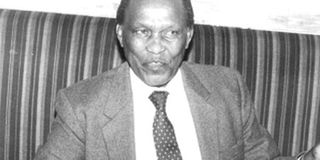Ngei suspended over maize scam

Mr Paul Ngei was minister for Marketing and Cooperatives in 1965 when Kenya was hit by an acute maize shortage. A year later, he was suspended but an inquiry into the scandal cleared him and he returned to the Cabinet. FILE PHOTO |
February 23, 1966
Cabinet minister Paul Ngei was suspended as the government investigated a biting shortage of maize.
A terse statement from State House broadcast on KBC radio announced the suspension, but did not give any reasons at the time.
What baffled Kenyans was that Ngei was seen as indispensable to Kenyatta. He was his prison mate, among the famous Kapenguria Six pre-independence freedom fighters.
Events leading to the suspension went back to the previous year.
Ngei was Minister for Marketing and Co-operatives in 1965, when Kenya was hit by a serious shortage of maize. The situation had prompted the government to import the staple food from the US.
The Maize and Produce Board, the precursor of National Cereals and Produce Board, did not have any stocks in its strategic reserve.
Kenyatta formed the first commission in independent Kenya – Commission of Maize Inquiry – whose mandate was to investigate the cause. It was headed by Justice Chanan Singh, another pre-independence freedom fighter lawyer.
The law at the time required that no Kenyan could buy maize straight from farmers but from the Board. Still, one needed a permit to do so.
Ngei’s wife, Emma, owned Uhuru Millers of Kangundo – commonly referred to at the time as Emma Stores.
In the course of the inquiry, Ngei’s name popped up.
The Board gave evidence that Uhuru Millers obtained a permit to buy 2,000 bags, which was supplied and not paid for. All demand notes were returned with a postal stamp, “Return-to-Sender”.
Emma also testified that she had bought 300 bags from a Kisumu firm against the law.
The law also stipulated that if anyone bought maize from farmers which usually were cheaper than the Board’s price, he or she would pay the difference to the Board.
In short, Ngei’s wife owed the Board two debts – maize supplied and the differential.
At that time, Ngei had been moved to the Ministry of Housing and Social Services in a cabinet reshuffle.
On February 16, 1966, Nairobi Senator Clement Lubembe initiated a Motion in the Senate, calling for Ngei’s suspension from Cabinet as he would interfere with the inquiry.
This led to the suspension, which Ngei protested.
“I can prove my record is clean,” he declared.
The Singh Commission took four months. In its report, the commission censured Ngei but concluded he had not committed any criminal offence.
The Report said Ngei’s closeness to Uhuru Millers, which belonged to his wife compromised his position in government. It recommended that all ministers declare to the President, businesses owned by spouses, children and close relatives, before taking office. Kenyatta reinstated Ngei on May 29, 1966.




